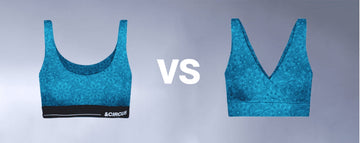In the vibrant textile hubs of Tiruppur and the innovative fashion scenes of Mumbai, a subtle yet significant shift is transforming how Indians approach everyday comfort. With skin sensitivities on the rise across urban landscapes, consumers are increasingly turning away from irritating synthetic materials toward gentler alternatives in their most personal garments. This movement isn't just about avoiding discomfort it's reshaping the intimate apparel sector, from men's underwear to women's lingerie and maternity essentials. In regions like Maharashtra, Karnataka, and Tamil Nadu, where reports of dermatological issues are climbing, hypoallergenic fabrics are emerging as a vital solution, blending tradition with modern science to cater to sensitive skin needs.
Uncomfortable underwear shouldn't steal your confidence. At Andcircus, we craft ultra-soft, sustainable Lenzing Modal Micro® innerwear for every body, XS to 5XL. From briefs to bras, our custom packs fit you perfectly. Shop risk-free with our 100% satisfaction guarantee and embrace comfort that includes everyone. #LoveEveryBody. Shop Now!
Exploring Hypoallergenic Intimate Wear: Safer Options for Sensitive Skin in India's Apparel Market
Rising consciousness in states such as Maharashtra, Karnataka, Tamil Nadu, Delhi, Telangana, Uttar Pradesh, Gujarat, Haryana, Kerala, and West Bengal is fueling the push for skin-friendly textiles in undergarments and related products. A comprehensive global market report on sensitive skin care reveals a sector valued at $44.36 billion in 2024, projected to expand to $48.42 billion by 2025 at a compound annual growth rate (CAGR) of 9.1%, and further to $68.12 billion by 2029 at a CAGR of 8.9%. While primarily focused on products like cleansers, moisturizers, and sunscreens, this growth underscores broader trends in skin health that extend to apparel, driven by urbanization, increased allergies, and heightened consumer awareness in India's bustling cities.
In the packed dermatology clinics of Delhi and the steamy environs of Chennai, individuals frequently report irritations from polyester-laden intimates. Health authorities in Maharashtra and Kerala have documented escalating instances of contact dermatitis, frequently associated with subpar synthetic textiles. This has propelled a transition to hypoallergenic intimate apparel garments engineered with natural or specially treated fibers to reduce allergic reactions and enhance comfort. For India's apparel industry, this represents not only a health imperative but also a lucrative opportunity, as brands adapt to meet the demands of a more discerning clientele seeking both functionality and style.
Emerging Trends in Hypoallergenic Fabrics
Tamil Nadu's Tiruppur stands out as a powerhouse in this evolution, with its organic cotton clusters ramping up output of hypoallergenic materials to satisfy both local shoppers and international buyers. In Gujarat's Kutch district, skilled weavers are merging age-old techniques with contemporary requirements, crafting airy cottons that are gentle on the skin and devoid of aggressive chemicals or dyes. These developments resonate strongly with city dwellers who emphasize holistic well-being, positioning such fabrics as premium choices in the intimate wear segment.
Over in Maharashtra and the Delhi National Capital Region (NCR), entrepreneurial ventures are pioneering with cutting-edge options like modal and aloe-vera-enriched cloths. Designers in Mumbai are developing undergarments that efficiently manage moisture, providing a seamless feel akin to bare skin. Delhi's burgeoning fashion technology ecosystem is delving into eco-friendly composites, drawing from sustainable sources such as Lenzing Modal® to appeal to those balancing aesthetics and skin safety. In Kerala, an intriguing fusion is taking shape through Ayurveda-influenced textiles, where cottons dyed with herbs like neem are integrated into underclothing, delivering calming properties tailored for sensitive epidermises.
These advancements go beyond mere tactile appeal; they are grounded in rigorous research. The aforementioned market report outlines key trends, including the rise of clean, sustainable formulations and technological progress in product delivery systems, which parallel innovations in textile engineering. In India's metropolitan areas, where social media influencers and dermatologists amplify skin health education, such trends are accelerating adoption, fostering a market where sensitivity meets sophistication.
Furthermore, the report's PESTEL analysis illuminates the broader context: politically, regulations on cosmetics and textiles influence safety standards; socially, an aging population and growing allergy prevalence drive demand; technologically, advancements enable better fabric treatments; environmentally, the shift toward organic materials addresses sustainability; legally, compliance with ingredient and product safety norms is crucial; and economically, factors like inflation and interest rates impact consumer spending. Drivers such as increased skin sensitivities evidenced by reports like the UKHSA's 2022 findings on rising infections propel growth, while restraints include competitive pressures and supply chain hurdles.
Real-World Impact: From Maternity to Children's Wear
Hyderabad, the heart of Telangana, exemplifies this transformation in maternity attire. Regional labels are heeding advice from obstetricians by introducing blends that prioritize hypoallergenicity for pregnant women, whose skin often becomes more reactive. Utilizing bamboo or pure organic cotton, these items alleviate common irritations, enhancing comfort during a vulnerable phase. Feedback from users highlights the exceptional gentleness and airiness of bamboo-derived maternity supports, turning them into sought-after items in local stores.
In Karnataka's Bengaluru, a nexus of technology and style, companies are harnessing bamboo and modal to produce opulent yet protective lingerie. This caters to ambitious young workers who integrate sustainability into their lifestyles, viewing skin care as an extension of overall wellness. Shifting to West Bengal, Kolkata's marketplaces are witnessing a boom in organic cotton undergarments for children. Guardians, cautious of artificial material's risks, are gravitating toward verified hypoallergenic varieties to safeguard their offspring's tender skin, reflecting a parental shift toward preventive health measures.
Such examples underscore a pivotal change: health is eclipsing mere utility in consumer choices. The market analysis emphasizes how societal shifts toward wellness and environmental consciousness are redefining preferences, especially in India's urban pockets where digital platforms amplify these narratives.
Challenges in Scaling Hypoallergenic Apparel
Yet, progress is tempered by obstacles. In price-conscious areas like Uttar Pradesh and Haryana, cost remains a formidable barrier. Fabrics derived from organic or foreign-sourced elements carry premium pricing, limiting reach among countryside populations who prioritize affordability over specialized features. In Gujarat and Delhi NCR, the absence of widespread certifications exacerbates distrust; numerous products lack Bureau of Indian Standards (BIS) or International Organization for Standardization (ISO) endorsements for hypoallergenicity, fostering consumer hesitation in verifying "gentle on skin" assertions.
Logistical issues in supply chains add layers of complexity. India's heavy reliance on imported bamboo and modal, due to constrained domestic growth, inflates expenses and disrupts production flows for key players in Tamil Nadu and Gujarat. Addressing these requires bolstering indigenous sourcing, enhancing educational initiatives, and streamlining certification processes to foster trust and broaden market penetration.
The macro-economic insights from the report further contextualize these challenges: geopolitical tensions, such as the Russia-Ukraine conflict, alongside inflation and elevated interest rates, strain supply chains and consumer budgets. The lingering effects of COVID-19 recovery also play a role, influencing global trade in raw materials essential for hypoallergenic textiles.
Opportunities for Growth
Beyond hurdles lies substantial potential. India's expanding urban middle class, concentrated in hubs like Mumbai, Bengaluru, and Delhi, is propelling interest in health-oriented clothing. With rising incomes, these locales offer fertile terrain for upscale brands to thrive. On the international front, Tamil Nadu and Gujarat's textile strongholds are eyeing exports, establishing themselves as go-to sources for quality hypoallergenic goods in global arenas.
In Kerala and Telangana, medical institutions are unexpectedly catalyzing this sector. Specialists in dermatology and gynecology are advocating for these fabrics among patients with skin ailments or postpartum women, carving out a specialized niche for therapeutic apparel. This convergence of medicine and moda heralds a comprehensive approach to well-being, with clothing firms collaborating with healthcare providers to market their offerings effectively.
The strategic framework in the report reinforces this optimism, advocating investments in research and development (R&D) and robust supply networks to capitalize on the projected expansion in the sensitive skin care domain, which, while centered on topical products, aligns with apparel innovations through shared emphases on gentleness and sustainability.
A Softer Future for Sensitive Skin
As the Indian apparel landscape matures, prospects appear plush, eco-conscious, and attuned to skin health. Experts in dermatology from Maharashtra and Karnataka anticipate hypoallergenic intimate wear achieving widespread acceptance in the coming five to seven years. Production leadership is likely to stem from Tamil Nadu and Gujarat, with consumption spearheaded by Maharashtra and Delhi. Drawing from the report's forecasts, India's niche in skin-sensitive garments is set for vigorous growth, mirroring the global CAGR of 8.9% through 2029, propelled by urban expansion and informed consumerism.
For industry stakeholders, actionable steps include channeling resources into region-specific R&D, fortifying procurement of gentle fibers, and initiating targeted outreach to enlighten buyers. In a nation as multifaceted as India, where fabrics intertwine with heritage, hypoallergenic clothing transcends merchandise it's a commitment to solace and vigilance. Spanning Tiruppur's weaving mills to Bengaluru's chic outlets, this evolution is weaving a more resilient, greener tomorrow for those with delicate skin.
Frequently Asked Questions
What are the best hypoallergenic fabrics for sensitive skin underwear in India?
The top hypoallergenic fabrics for sensitive skin include organic cotton, bamboo, modal, and aloe-vera-enriched materials. These natural and specially treated fibers reduce allergic reactions and provide better comfort compared to synthetic polyester blends. States like Tamil Nadu and Gujarat are leading production of these gentle fabrics, with some incorporating Ayurveda-influenced textiles using herbs like neem for additional soothing properties.
Why is there a growing demand for hypoallergenic intimate wear in Indian cities?
Urban areas in Maharashtra, Karnataka, Tamil Nadu, Delhi, and other major states are experiencing rising skin sensitivities due to pollution, stress, and increased exposure to synthetic materials. Health authorities have documented escalating cases of contact dermatitis linked to poor-quality synthetic textiles. This has driven consumers toward hypoallergenic options, with the sensitive skin care market projected to grow at 8.9% CAGR through 2029.
What challenges do consumers face when buying hypoallergenic undergarments in India?
The main challenges include higher costs compared to regular synthetic underwear, lack of proper certifications from Bureau of Indian Standards (BIS) or ISO for hypoallergenic claims, and limited availability in rural areas. Additionally, India's reliance on imported bamboo and modal materials increases prices and can disrupt supply chains, making these premium products less accessible to price-conscious consumers in states like Uttar Pradesh and Haryana.
Disclaimer: The above helpful resources content contains personal opinions and experiences. The information provided is for general knowledge and does not constitute professional advice.
You may also be interested in: Inclusive Options and Designs Underwear for Gender-Neutral and
Uncomfortable underwear shouldn't steal your confidence. At Andcircus, we craft ultra-soft, sustainable Lenzing Micro Modal innerwear for every body, XS to 5XL. From briefs to bras, our custom packs fit you perfectly. Shop risk-free with our 100% satisfaction guarantee and embrace comfort that includes everyone. #LoveEveryBody. Shop Now!







































